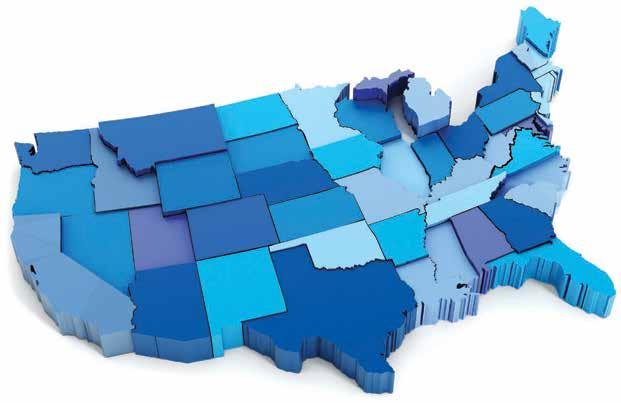
5 minute read
Last Word
The Robocall Crackdown
Lawmakers and federal agencies are making it harder for robocalls to get through. Stringent rules govern the practice. BY NANCY A. ORY
The Federal Trade Commission (FTC) has launched a major crackdown on illegal robocalls and has recently taken more than 100 actions targeting operations around the country that are responsible for more than 1 billion robocalls.
“Operation Call it Quits” is part of the FTC’s ongoing effort to end the scourge of pre-recorded telemarketing calls. Resulting judgments and consent decrees require companies violating the robocall laws to pay millions in forfeitures in addition to reparations to defrauded consumers. Violators also risk costly class action lawsuits, with statutory penalties ranging from $500 to $1,500 per call.
An examination of the current state of the law may help reduce the risk of your company inadvertently becoming subject to enforcement action.
In case you’re not sure what a robocall is, that’s what happens when you answer the phone and hear a recorded message instead of a live person. Robocalls are generally trying to sell you something and are nearly all illegal. When a robocall uses a fake name and number, it is called “spoofing.”
WHAT’S LEGAL, OR NOT?
The federal Telephone Consumer Protection Act of 1991 (TCPA) regulates all automated calls. With respect to any call to a landline, telemarketers need prior consent to leave a pre-recorded message (subject to limited exceptions for entities such as nonprofits, as discussed below).
A separate TCPA provision prohibits any call to a mobile device using any “automatic telephone dialing system or artificial or prerecorded voice” without obtaining the recipient’s prior express consent. Under the rules for calls sent to mobile devices, this consent must include advance disclosures that: a) the call is being sent using an automatic telephone dialing system, and b) the consent for the call is not conditioned on a purchase of goods or services.
Be advised that the law treats text messages delivered by an “automatic telephone dialing system” (known as robotexts) as calls.
If a robocall is trying to sell you something, it is illegal unless the company has your written permission to call that way. Under limited exceptions to the law, certain robocalls do not require permissions:
a) messages that are purely informational (such as flight information and delayed school openings); b) debt collection calls; c) political calls; d) calls from certain health care providers (such as prescription renewals); and e) messages from charities, with certain limitations.
Federal law requires all telephone calls using pre-recorded messages to identify who is initiating the calls and to include a telephone number or address where the initiator can be reached. Some states have additional laws that regulate or prohibit robocalls.
If a robocall is trying to sell you something, it is illegal unless the company has your written permission to call that way.
LEGISLATION AHEAD
At the demand of constituents, legislation has been making its way through Congress to try to address the scourge of robocalls. The Senate passed the Telephone Robocall Abuse Criminal Enforcement and Deterrence Act (known as the TRACED Act) in May 2019. The House passed the Stopping Bad Robocalls Act in July 2019.
The House and Senate now need to reconcile the two bills. At press time, that was expected to happen sometime in fall 2019. The acts seek to give regulators stronger enforcement tools and also require phone carriers to implement call identification technology.
The Federal Communications Commission recently empowered the major telecommunications carriers to block by default illegal or unwanted calls based on reasonable call analytics before the calls even reach consumers. The pending legislation discussed above would require the big carriers to implement this technology – known as SHAKEN/STIR. The technology creates a call authentication system using digital fingerprints, or tokens, to help providers determine if the number that shows up on caller ID is the same as the number from which a call is placed.
AVOIDING VIOLATIONS
The best practice to avoid violating the law is to make calls one at a time, with a live person delivering the message. Companies should keep a record of individuals who have consented to be contacted; use technology to screen out mobile telephone numbers that get reassigned to new subscribers; and have a system to track and remove individuals who revoke consent.
It is also advisable to seriously reconsider engaging in the practice of using robocalls at all. First, consumer annoyance at the daily harassment of unwanted robocalls is sure to alienate potential customers. Second, you risk tarnishing your brand by using a method of communication that has primarily become associated with fraud and scams.
Nancy A. Ory is an attorney with Lerman Senter PLLC. She can be reached at (202) 416-6791 or nory@lermansenter.com.
MEDIA WHYS HAS MEDIA-SPECIFIC CREDIT INFORMATION FROM ADVERTISERS IN THE TOP 100 DMAS.
WHAT CREDIT REPORTS ARE YOU RELYING ON?
is the ONLY credit report that provides exclusive payment information FROM Media Companies FOR Media Companies. Our reports include complete credit data from twelve media companies, representing 97% of the top 100 DMAs, and our media partners continue to increase!
Analyze how advertisers actually paid other media companies and you’ll have the best information to assess credit worthiness and keep your bad debt low. Plus, our reports include collection filings, tax liens, judgements, corporate linkage, payment trends, and trade data from D&B® or Experian®.


Start making better credit decisions with local, media-specific data from your industry association – BCCA.
MORE technique. MORE tact. MORE client retention.
When you know exactly what to do and exactly how to do it, you can be MORE successful. At Szabo Associates, we’ve spent decades learning and refining the tricks of our trade. So when clients come to us for help collecting media receivables, no one can do MORE than we can.

There is considerable technique and technology involved in collections. We have the largest media accounts database in the world containing information on over 600,000 media advertising companies. We can immediately access this data, check payment histories and patterns, analyze them and plot the exact strategy needed to maximize collection. No one else has MORE information and MORE knowledge on how to use it. Tact is equally important. This doesn’t come from a computer or a manual. It only comes from experience. Knowing when to be firm and when to be gently persuasive can make all the difference. Not only can MORE of the debt be recovered, but valuable client relationships can be preserved. At Szabo, our job is to recover your money without losing your clients. We have the technique, the tact and the experience to do both. It’s why Szabo can do MORE.
Szabo Associates, Inc. 404-266-2464 www.szabo.com info@szabo.com





